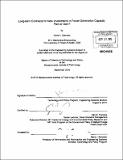| dc.contributor.advisor | John E. Parsons. | en_US |
| dc.contributor.author | Sakhrani, Vivek A. (Vivek Ashok) | en_US |
| dc.contributor.other | Massachusetts Institute of Technology. Technology and Policy Program. | en_US |
| dc.date.accessioned | 2011-04-04T19:34:10Z | |
| dc.date.available | 2011-04-04T19:34:10Z | |
| dc.date.copyright | 2010 | en_US |
| dc.date.issued | 2010 | en_US |
| dc.identifier.uri | http://hdl.handle.net/1721.1/62130 | |
| dc.description | Thesis (S.M. in Technology and Policy)--Massachusetts Institute of Technology, Engineering Systems Division, Technology and Policy Program, 2010. | en_US |
| dc.description | Cataloged from PDF version of thesis. | en_US |
| dc.description | Includes bibliographical references (p. 132-137). | en_US |
| dc.description.abstract | In recent years, a debate has ensued regarding the role of long-term power purchase agreements for securing investments in power generation capacity in organized wholesale markets. This thesis illuminates the issues surrounding the debate and provides a framework for understanding the nature and use of long-term contracts. The main questions of interest for the formulation of a policy on long-term contracts are (1) whether parties encounter obstacles to their beneficial use and (2) in what situations should policy encourage or compel market entities to enter into such agreements? The analysis finds that long-term contracts do not appear to be "essential" for securing new investments in generation capacity. Long-term contracts are desirable in cases where the investments are highly specific to the relationship. Relationship-specificity is not a general feature of the industry; power producers or customers that find themselves in relationship-specific situations can identify the gain available through the use of specific assets and choose to use a long-term contract. However, this is a voluntary business decision and does not call for explicit policy guidance. Additionally, contracts are inherently "incomplete" and create the possibility of ex post regret and stranded costs. The electricity industry in the U.S. is familiar with the potential for significant economic distortions in the aftermath of the indiscriminate use long-term contracts. Policymakers should avoid mandating their use, and be careful to disapprove contracts that present a significant risk of ex post regret. Obstacles appear to exist for the beneficial selective use of long-term contracts. Current rules in restructured markets preclude the consideration of long-term contracts for most types of generators and make it unfeasible for the economy to benefit from relationship specific circumstances. Policies should encourage or require the selective use of long-term contracts only in relationship-specific situations where identified non-zero sum gains are not being realized under dominant practices. In cases where these gains are not observable or are insignificant, the long-term contracts are more likely to cause pain than gain. | en_US |
| dc.description.statementofresponsibility | by Vivek A. Sakhrani. | en_US |
| dc.format.extent | 142 p. | en_US |
| dc.language.iso | eng | en_US |
| dc.publisher | Massachusetts Institute of Technology | en_US |
| dc.rights | M.I.T. theses are protected by
copyright. They may be viewed from this source for any purpose, but
reproduction or distribution in any format is prohibited without written
permission. See provided URL for inquiries about permission. | en_US |
| dc.rights.uri | http://dspace.mit.edu/handle/1721.1/7582 | en_US |
| dc.subject | Engineering Systems Division. | en_US |
| dc.subject | Technology and Policy Program. | en_US |
| dc.title | Long-term contracts for new investments in power generation capacity : pain or gain? | en_US |
| dc.type | Thesis | en_US |
| dc.description.degree | S.M.in Technology and Policy | en_US |
| dc.contributor.department | Massachusetts Institute of Technology. Engineering Systems Division | |
| dc.contributor.department | Technology and Policy Program | |
| dc.identifier.oclc | 708361818 | en_US |
